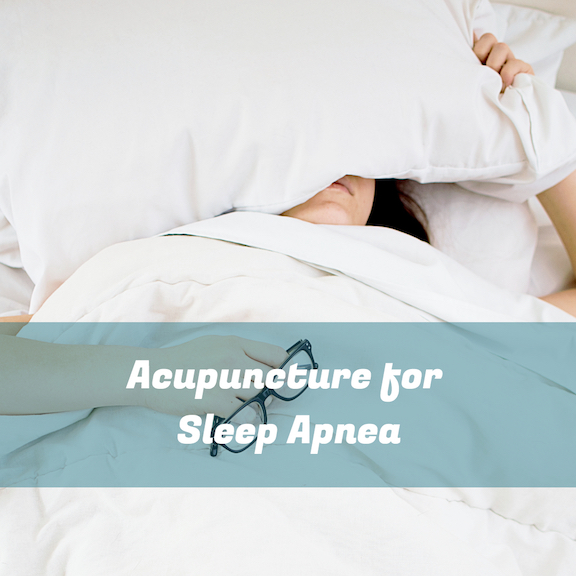Acupuncture for sleep apnea is a condition where breathing stops for short periods of time during sleep, and can occur up to 100 times in one hour. Sleep apnea is something that affects 18 million adults in the United States (and many are not diagnosed), and is usually more common in men than women. Acupuncture can help with reducing stress, encouraging relaxation, and ultimately helping you get a better night’s sleep.
What is Sleep Apnea?
Sleep apnea is a condition where the airway is restricted while sleeping most often due to an anatomical abnormality in the upper airway. Someone with sleep apnea will have short episodes throughout the night where they briefly stop breathing, and it reduces the oxygen levels in the body.
Sleep Apnea can lead to the following side effects:
- Sleepiness
- Irritability
- Depression
- Reduced concentration
- Reduced memory
- Sexual dysfunction
- Cardiac and metabolic conditions
Sleep apnea can affect both adults and children, however, it is more common in those with pre-existing medical conditions like obesity, thyroid conditions, and nasal obstruction. There are also various types of sleep apnea depending on the exact blockage that is occurring.
There are three types of Sleep Apnea:
- Obstructive Sleep Apnea – this is caused by a blockage of the airway. Most times it is when the tongue collapses against the soft palate, and the soft palate falls against the back of the throat while someone is sleeping therefore closing the airway.
- Central Sleep Apnea – unlike the type above, the airway is not blocked, but the brain neglects to signal the muscles to breathe.
- Complex Sleep Apnea – this type is a combination of the above two conditions. Each time the person experiences an apnea event, the brain partially wakes the person signaling breathing to resume. Those with a severe case of sleep apnea, this will happen hundreds of times in a night usually during rapid-eye-movement (REM) sleep which is late in the sleep cycle. This results in extremely broken up sleep as well as poor quality sleep. This condition, in addition, is still reducing oxygen in the blood which further stresses the person’s physical well-being.
If sleep apnea is left untreated, symptoms of sleep apnea can include disturbed sleep, high blood pressure, congestive heart failure, heart attack, cardiac arrhythmia, depression, or stroke.
Sleep Apnea Western Treatment
The standard treatment for sleep apnea is involving a machine called nCPAP. This machine is fairly well known to be the treatment for sleep apnea, and allows for continuous airway pressure involving a mask or tube on the mouth and/or nose providing constant oxygen. The role of the nCPAP machine is to control oxygen levels therefore addressing symptoms of sleep apnea like fatigue & cardiovascular disease. In the event that a person has severe obstructive sleep caused by anatomical abnormalities or if the nCPAP fails or is insufficient, a dental appliance or surgery may be recommended.
Acupuncture for Sleep Apnea -How does it work?
Before receiving acupuncture treatment for sleep apnea, your acupuncturist will learn as much as possible about your medical history and lifestyle. Traditional Chinese medicine (TCM) believes issues that arise in the body are caused by a blockage of qi (energy) flow in the body. Your acupuncture provider will take a detailed history and exam so they can determine the best acupuncture treatment protocol for your sleep apnea.
Acupuncture for sleep apnea works by energizing the muscles of the airways in the upper respiratory system, which we learned earlier usually collapse during events of sleep apnea. Some acupuncturists will use a technique called auricular acupuncture to help with this condition. Auricular acupuncture treats the ear as a microsystem. Instead of using the meridians, each of which is dedicated to an organ, the microsystem of the ear has the entire body represented on the auricle (the outer portion of the ear).
Critical points are stimulated by inserting the hair-thin acupuncture needles into the outer parts of the ear. Your acupuncturist may also have you continue this treatment at home with acupressure sending you home with ear seeds. Ear seeds are small seeds that are placed on the acupuncture points of the ear by your acupuncturist normally with adhesive tape so as to continue treatment in the interim between sessions.
Classical acupuncture is also used in the treatment of sleep apnea. By using both classical acupuncture and auricular (ear) acupuncture, it can allow for these to connect best to the central nervous system addressing symptoms and underlying problems that create sleep apnea.
Acupuncture Points for Sleep Apnea:
- CV23 – Ridge Spring – Lian Quan –
used for mouth/throat disorders. Swelling/pain in the mouth/throat. This point
is frequently used for sleep apnea as it is located on the throat.
- HT7 – Spirit Gate – Shen Men – deals
with emotional issues related to sleep, insomnia. Located at the crease of the
wrist.
- EX-HN1 – God’s Cleaverness –
Shishencong – good with memory or thinking, and is also a calming point.
- LU7 – Broken Sequence – Lie Que –
command point of the head and posterior neck. Useful for any conditions
involving these areas (sleep apnea). Also located in a different point in the
crease of the wrist.
- KD6 – Shining Sea – Zhaohai – used for issues involving disturbed sleep like insomnia or sleep apnea. Located on the lower part of the leg.
There are a separate set of points that may be used in ear acupuncture for sleep apnea. Auricular acupuncture has a microsystem encompassing the whole body on the ear.
Auricular Acupuncture Points:
- Subcortex
- Liver
- Spleen
- Heart
- Shenmen
- Occiput
Within the realm of treatment with acupuncture and traditional Chinese medicine (TCM) for sleep apnea, are traditional herbs. These are often used to go along with your acupuncture treatment. In the case of sleep apnea, there are two herbs that make up the herbal formula B210. A recent study in 2018 that showed the B210 herbal formula to help reduce snoring.
The two traditional herbs in formula B210:
- Gastrodia Elata – this is a
saprophytic perennial herb, and is one of the three orchids listed in the
earliest known Chinese Materia Medica.
- Cinnamomum Cassia – also known as Chinese cassia or Chinese cinnamon, is an evergreen tree, but is used mostly for their aromatic bark which is used as a spice.
Acupuncture & Sleep Apnea
Sleep apnea is a serious medical condition affecting many Americans, and those suffering from sleep apnea can have a level of 78% blood oxygen level or less increasing their risk for cardiac death by 80%.
Acupuncture as a treatment modality for sleep apnea that can help increase the oxygen in the blood by increasing blood flow to the areas that need it. Acupuncture may also help reduce other factors that may contribute to sleep apnea, such as like stress & being overweight. There were two studies done, one in 2010 in Brazil, and the other done in 2016. Both of these studies show acupuncture to be effective in the treatment of sleep apnea, and in the study from 2010 found it to be more effective than the nCPAP machine.
More larger scale studies are needed on acupuncture for sleep apnea, but these results show a promising future for acupuncture & traditional Chinese medicine for sleep apnea patients.

Acupuncture for Sleep Apnea Near Me
Get acupuncture near you today with Best Acupuncture Near Me, and contact a local acupuncture practitioner to find out if acupuncture for Sleep Apnea is right for you.

